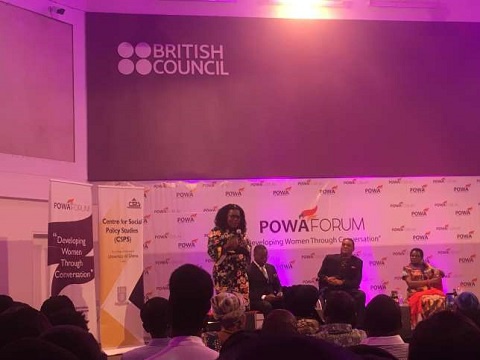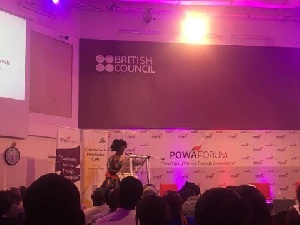The Progressive Organisation for Women Advancement (POWA) has organised its second forum to discuss women’s participation in the Ghanaian political space.
The forum, which was held on Monday, July 23, 2018, at the British Council in Accra, was themed: “How has the media impacted on the participation of Ghanaian women in politics?”
A host of personalities from diverse backgrounds in media, politics, gender and academia, took turns discuss the challenges that negate women’s inclusiveness in politics, whiles also highlighting some actions of the media which tend to discourage women from being actively involved in politics.
Delivering the opening address, Executive Director of POWA, Victoria Lakshmi Hamah said it’s time to challenge the notion that politics is not suited for women.
“The advancement of any society can only be effectively measured by the advancement of women. The social position of women is integrally connected with the social positions of all marginalized persons of any society. Historically, women have been marginalized and thus require special support in order to achieve for them social justice and sustainable wellbeing,” Mrs. Hamah said.
“It is necessary that women participate in the politics of our country and be recognized as true and active patriots like their male counterparts. That is why this year’s dialogue at this forum is to digest, probe, classify and discover whether the Ghana media has impacted positively or negatively in Ghanaian women in politics,” she added.
Contributing to the discussion, president of the Ghana Journalists Association (GJA), Roland Affail Monney said the media “is the most potent entity on earth and has the capacity to control the minds of the masses”.
He said current governments must take a leaf from the books of Dr. Kwame Nkrumah who preserved as many as 20 seats in Parliament for women in the First Republic. He urged the media to endeavor to highlight the successes of women just as they do for men in politics.
According to him, the media must completely eschew habits that have to do with stereotypical reporting, adding that this would help improve women’s inclusiveness and participation in national politics.
“The NDC and NPP have revolutionary roles to play in enhancing the representation of women in politics. In this respect, the media must exert sufficient and tenacious pressure on them to provide electoral life-jackets in their safe constituencies for their female candidates to swim easily to Parliament,” Mr. Monney further stated.
The five-member panel of Prof. Audrey Gadzekpo, Ivor Greenstreet, Nana Oye Lithur, Madam Elizabeth Ohene and ace journalist Paul Adom-Otchere also delved deeper into the subject matter with opinionated views.
Prof. Audrey insisted the biggest disadvantage to women in the political space has to do the issue of visibility. According to her, the reason why we hear less women voices in public discourses is because women in general are usually afforded less space in the media.
In her view, less visibility in the media space kills familiarity with electorates and that gives male politicians an advantage going into elections. She, therefore, urged the media to give equal opportunities to both male and female politicians in order to bridge this gap.

Politician and stalwart of the Convention People’s Party (CPP), Ivor Greenstreet, also lamented the “media sexism” in the country. This, he said, is done indirectly by fronting a perception in the minds of the public that women are not capable.
He said countries like Rwanda, South Africa, Burkina Faso, Niger and Uganda, who have great female participation in Parliament have shown the way that women can do well in politics and effective governance. He called on the media to stop painting pictures of women as persons who cannot rise to the top, but rather focus on reporting facts.
Media guru Paul Adom-Otchere was also of the view that many women shy away from taking political positions because of historical events which are not in their favour and therefore tend to intimidate them.
He pointed to happenings in the 1970s and 1980s where women who were well-to-do were ascribed all sorts of negative names, with their successes being called into question.
According to him, till date the media does not highlight many of the positive things that women do, insisting the best way to empower women to get into politics will be to “substitute the stigmatized history” that we have emphasised about women over the years. In his view, once the positives of women begin to be highlighted more in the media, the younger generation will also be encouraged to aspire.
Former Gender Minister, Nana Oye Lithur, also delivered a presentation on the troubles women go through with media frames. She said the media has become a business venture and, as such, websites, radio and television stations are only interested in driving traffic to their portals.
She explained that this scenario means that if the media has to sensationalise stories about women to get people to read, listen or view, they will readily do it without considering the consequences.

She further suggested that the National Media Commission (NMC) sets standards for media houses, which bars panelists from denigrating women, as well as ascribed legally binding sanctions to those who fall foul.
Another astute personality on the panel was veteran editor Elizabeth Ohene who spoke about the challenges that women face in combining gender roles and their political ambitions.
She explained that the room and space for women is taken up by important domestic responsibilities. She said whiles men have the luxury of contributing to morning shows, women are faced with task of preparing breakfast and other domestic responsibilities which hinder them from also contributing.
She, however, stated that the call for gender parity does not mean females should be handed positions on a silver platter.
According to her, every woman must prove that she is capable to achieving great things or should prove capable before being put in high office.

Prof. Abena Oduro of the Centre for Social Policy Studies (CSPS) at the University of Ghana added: “The media has a major role to play in facilitating of women entry into politics. It informs the views of electorates and therefore can influence the electorates decision on who to vote for.
“A study conducted some years ago in Ghana found that women were underrepresented in media coverage. When women are reported in the media, how are they represented? Which traits of women vying for leadership positions are portrayed? Are the traits that are portrayed those which will increase their chances of being selected by the electorates? When they are leadership position, are women’s achievements highlighted and discussed?”
The panel discussion of the second POWA forum was moderated by media personality, Eric Don-Arthur.
General News of Tuesday, 24 July 2018
Source: pulse.com.gh

















